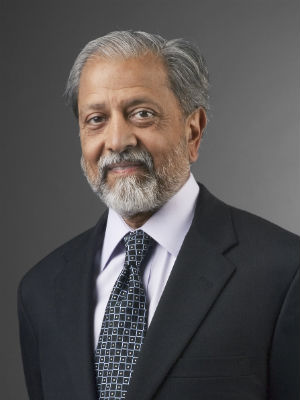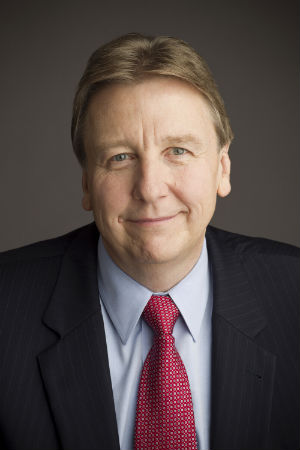 Come Jan. 1, 2015, FM Global will have a new CEO. But talkto current chairman and CEO Shivan Subramaniam and incoming CEOThomas Lawson and it's clear the philosophy that drives theorganization's success will remain intact.
Come Jan. 1, 2015, FM Global will have a new CEO. But talkto current chairman and CEO Shivan Subramaniam and incoming CEOThomas Lawson and it's clear the philosophy that drives theorganization's success will remain intact.
For example, while FM Global is an insurance company, both mensee insurance as a secondary function of the organization. Lawsondescribes FM Global as “an engineering company that also doesinsurance,” adding the primary goal is to use FM Global'sengineering and scientific expertise to make facilities resilientbefore there is a loss.
|“We share the fundamental belief that the majority of loss ispreventable,” Lawson, who currently serves as executive vicepresident, says.
|Subramaniam says FM Global is “a knowledge-based provider ofservices and capacity,” and, similar to Lawson, he sees insuranceas just a component of those services.
|“We say this again and again to our clients,” says Subramaniam,“the goal is to not have an interruption. And if they do have aninterruption, to make sure they get up and start to produceproducts or deliver services as quickly as possible. And we helpthem do that. And then at the tail end of that is really theinsurance product that takes care of, to some extent, the economicloss they're going to have.”
| As further evidence that Subramaniam and Lawson arereading from the same playbook, both give nearly identical answerswhen summing up the message the company brings to its clients:
As further evidence that Subramaniam and Lawson arereading from the same playbook, both give nearly identical answerswhen summing up the message the company brings to its clients:
“Insurance alone is not enough. The focus should really be onrisk management,” Subramaniam says.
|Says Lawson: “Insurance alone isn't enough. You really need totake control of your own destiny.”
|Growing with FM Global
|The similarities in their outlooks are at least in part due tothe long careers both Subramaniam and Lawson have had at FM Global,reaching back well before the current company was formed throughthe merger of five organizations in 1999.
|Subramaniam joined Allendale Insurance, an FM Global predecessorcompany, in 1974 and was elected president in 1992. After the 1999merger, he was elected president and CEO of FM Global and was namedchairman in 2002.
|Lawson began working in the organization in 1979 as a fieldengineer, where he helped clients understand risk. He moved to theinsurance side eight years later, and finally moved to theNortheast and managed the integration of the research entity intothe newly merged company.
|Lawson notes the benefits of not just his longevity in theorganization, but the different roles he has assumed over theyears, saying he has had “different careers in the same company.”He adds he has gained “firsthand knowledge of where it all starts”having worked as a field engineer, and has gained valuable insightsworking among teams in a wide range of areas within thecompany.
||The years put in at FM Global have instilled an appreciation forthe company's tradition and people in both Subramaniam andLawson.
|Asked to name his greatest accomplishment during his time asCEO, Subramaniam does not mention the company's growth—from about$1 billion in revenue at the time of the 1999 merger to nearly $6billion today—but rather his luck in being able to “lead anextraordinary group of people over time. I think we have such agreat product and everyone's proud to deliver that product on aworldwide basis, and that's what's made us successful. That's atthe heart of our success.”
|Lawson likewise says his 35 years with the company have givenhim an appreciation for “how great our people are,” and he says thecompany's “long-term tradition of stability” will not change eventhough its leadership will. “That's how we operate the company,” hesays.
|That said, changes are afoot in both the insurance market andthe global business landscape FM Global's clients operate in, andthe company must adapt and adjust.
|Global clients and growing risks
|Subramaniam, reflecting on the challenges during his time asCEO, says, “Tomorrow always trumps yesterday.” While his initialchallenge in 1999 was integrating five companies into a singleenterprise—and doing so during the prolonged soft market of thelate 1990s—he speaks more in-depth about the current challenge:serving clients that are rapidly expanding into new regions aroundthe world.
|The typical FM Global client, he says, is multinational andgrowing outside of its own footprint—for example, a company basedin Cleveland or San Francisco, but growing outside of NorthAmerica.
|“And when they do grow outside of North America, almost alwaysthey're not building what we call greenfield facilities; they'rebuying some existing facility somewhere else to add to theirnetwork,” Subramaniam explains. “And almost always the quality ofthose locations, of those divisions they acquire, are not as goodas the quality of the locations they have within their existingfootprint. So our clients are growing, but the risk qualityis getting worse and the risk-management challenges are gettingmore significant.”
|On top of that, he says clients are not all growing in the sameterritories, but rather in different regions with differentlicensing requirements and regulations.
|For FM Global, which places its emphasis on risk management,this evolving global landscape, while presenting new challenges,has also brought opportunity. Subramaniam points out more companiestoday are focusing on risk-management needs, and the role of therisk manager within companies is expanding.
|“One of the reasons for our success is the fact that therisk-manager role in our clients' organizations has become so muchmore sophisticated and is at a much higher level than it used tobe,” he says. “So the result of all of that is our products andservices have become more attractive because the clients that wedeal with—these things are more important to them.” He says thesame companies 25 years ago may have been just buyers of insurance,whereas today they are managing the risk of the enterprise, whichdovetails with FM Global's strategy.
|As for the challenges, Subramaniam says as clients grow, therisks grow with them, and companies' rate of expansion can outpacethe ability to effectively manage the risks. To assist clients,Subramaniam says FM Global routinely works with local authoritiesin the new territories to improve codes and standards. The insureralso aggressively looks at engineering and risk-management schoolsin those territories to find local people to hire and train (withthe training almost always done in North America). FM Global hireslocally, he says, but must make sure the focus around the world isno different than the corporate culture.
|Lawson says the key for FM Global, as a research-based company,is to make the necessary investments in research and science tohelp stay on top of the developing risks. The business model forthe company does not change, he says, but the technology does,particularly as it relates to emerging risks such as cyber.
|That focus on science and resiliency also helps set FM Globalapart as the insurance marketplace changes. Lawson mentions thecapacity in the reinsurance market today, saying there is “morecapital than we've ever seen.” It “has a competitive effect,” hesays, but adds, “The key for us—regardless of what happens in themarket, our model doesn't change.”
|FM Global, he notes, has stuck to commercial property, and willcontinue to do so.
||Subramaniam agrees, noting the company's overall approach hasremained the same, even if the scale has changed. He says there'salways a place for a company that can provide services to clientswhile also offering large amounts of underwriting capacity on aworldwide basis. “There's a place for a player like that, andthat's FM Global.”
|A different insurance world
|He adds, “The whole issue is that we continue to do the samething that we do, but the scale has gotten quite dramatic.” He saysif someone had asked him in 1999 if he expected the company to bethe size it is today, he would probably have said no. “If you lookback, did we expect to be this much bigger? No. Did we expectto have scale help us as much as it has? No. Those would be thesurprises from that point of view.”
|Subramaniam also talks about the changes the insurance market ingeneral has undergone in that time. “As an industry, there's noquestion we're more analytical and significantly more sophisticatedin terms of the models and technologies we use. If you look at theindustry itself—and I just mean the commercial-propertyindustry—the level of sophistication we have today in terms of howwe assess risk and deliver risk as an industry is significantlybetter and significantly more focused than it used to be 16 yrsago.
|“Clearly I think the client and policyholder has benefittedenormously because as an industry we're much better at doing whatwe do.”
|Insurance processes have also evolved, Subamaniam says, notingthat 16 years ago it was challenging to put together amultinational policy involving six to eight different currencies.“Today those things are taken for granted—how people do that, hesays.
|He adds, “Sixteen years ago, it could take 9-12 months toproduce a policy. Today we deliver a policy to a client more oftenthan not before the inception date.”
|Legacy
|Asked what philosophy he has tried to instill at FM Global,Subramaniam pauses before saying, “I'm not big on introspection.”But he notes he has said publicly many times that FM Global is anorganization built on teamwork, and operates under the idea thatdifferent people with different skills can come together andproduce and deliver a product. “I've always felt that a decisionyou come to with an associate is probably better than a decisionthat you've come to by yourself,” he says.
|He explains a typical client-service team manages very largerelationships, and includes an account manager, an account engineerand policy experts. “When you have so many different relationships,if you don't have a good account team working well from a teammatepoint of view, you won't be successful,” Subramaniam says.
|Prompted for advice to pass on to Lawson, Subramaniam says,“Absolutely. The advice is always, don't do what I did. Be your ownperson.”
|But he adds of Lawson and Executive Vice President Jon Hall,“They're very capable people. I've worked with them for many years.I have the highest regard for them, and I know they'll make thiscompany even more successful than it's been in the past.”
Want to continue reading?
Become a Free PropertyCasualty360 Digital Reader
Your access to unlimited PropertyCasualty360 content isn’t changing.
Once you are an ALM digital member, you’ll receive:
- All PropertyCasualty360.com news coverage, best practices, and in-depth analysis.
- Educational webcasts, resources from industry leaders, and informative newsletters.
- Other award-winning websites including BenefitsPRO.com and ThinkAdvisor.com.
Already have an account? Sign In
© 2024 ALM Global, LLC, All Rights Reserved. Request academic re-use from www.copyright.com. All other uses, submit a request to [email protected]. For more information visit Asset & Logo Licensing.








